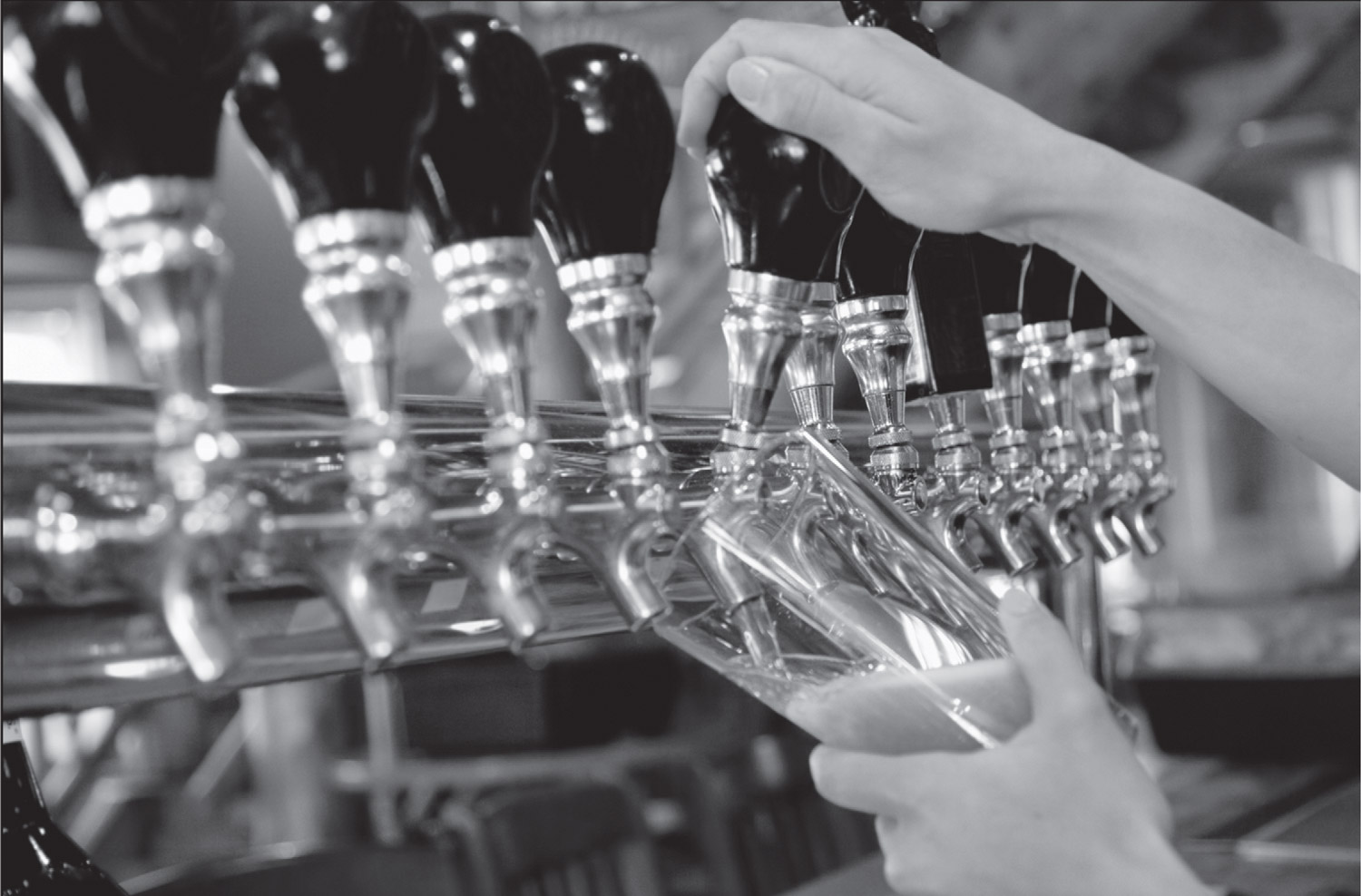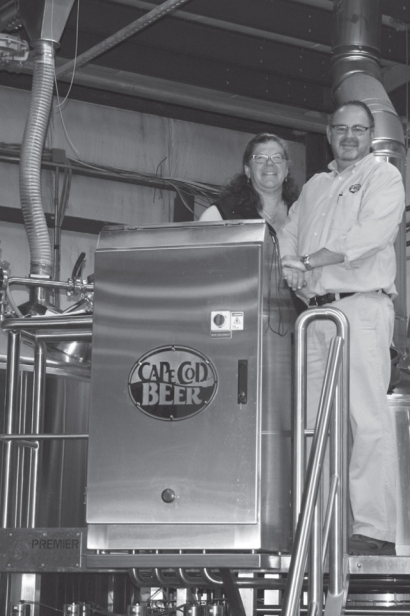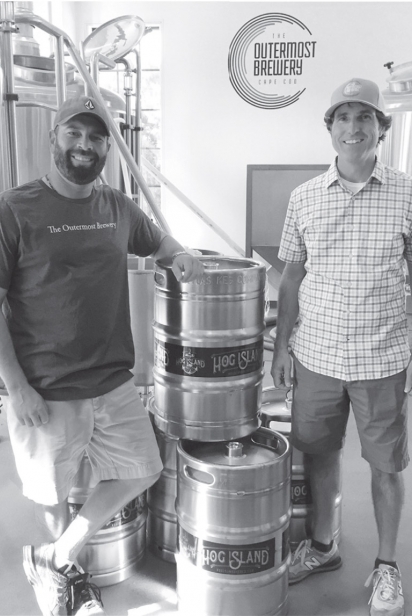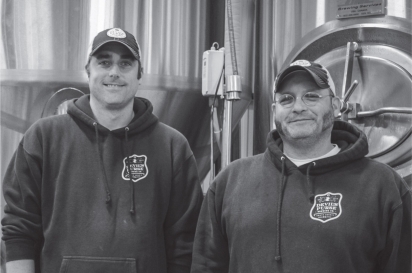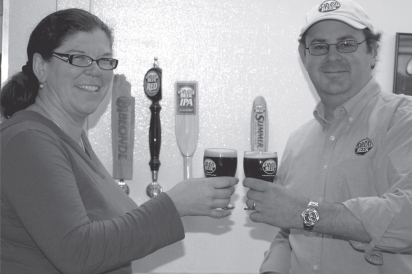Local Cheer: What’s Brewing on Cape Cod
Water. Hops. Grains. Yeast. The four main ingredients of beer are what bind the growing craft beer community on Cape Cod. The commonality of the businesses pretty much ends there, as Cape Cod Beer, Devil’s Purse Brewing Co. and Hog Island Beer Co. are as different as an IPA is to a stout. From different backgrounds to different business plans, diverse approaches are being taken in the local beer scene as it continues to grow and thrive amid consumers’ insatiable desire for craft beer.
According to The Brewers Association, the most recent statistics put the number of U.S. breweries in 2016 at just over 5300. Hard to believe that as late as 1984 there were fewer than a hundred breweries in the U.S. The meteoric rise began in the early 1990s and has continued, with a moderate recession in the early 2000s, through today. At some point the tide must turn, but the ebbing doesn’t appear to be in sight as breweries are opening their doors at a rate of more than one per day.
It was in the 1990s when Todd Marcus began the brewing career that would lead him to Cape Cod and the Hyannisport Brewing Co. Marcus launched his own brand, Cape Cod Beer, as the “Hyport” was in its final throes is a well-documented tale. That was in 2004. Thirteen years later, Cape Cod Beer has become what Marcus was battling against when he started. “You think about Sam Adams,” he explains. “Fifteen years ago, they were the little guy and now look at where they are.” The same can be said of Cape Cod Beer on a local scale.
Starting out, the challenge for Marcus was just breaking through and carving a niche in an ultra-competitive field dominated by behemoths that produced slight variations of “fizzy yellow beer”. The shoehorn that Marcus used to work his way into Cape Cod bars, restaurants and liquor stores was education, explaining to potential clients about the need for a local choice for beer lovers, and that it went beyond the flavor of the beer. Marcus was not only revealing his new product but also why he had created it. “I was promoting what we stand for,” he remembers. “What’s behind the beer.” For Marcus, that’s establishing a local business that hires local workers that, in turn, support other local business and charitable organizations. The passion behind the pitch had people signing on, and the clientele began to grow. That, and the flagship “Red” was a great tasting beer.
For Mike McNamara and Mark Powers of Hog Island Beer Co., their high school friendship evolved into a business partnership. The pair’s first endeavor was to open Finbars Landing on the Orleans rotary. After four years, they searched for bigger fish to fry…or at least to find a bigger kitchen in which to fry it (so to speak). They found just the place in the form of The Old Jailhouse Tavern on West Road in Orleans. As McNamara recalls, “We were looking to expand and went from one of the smallest restaurants in town to one of the biggest!”
Four years into their proprietorship, McNamara and Powers looked to the world of craft beer as a way to grow their venture. “We were creating great local food, and we wanted to add beverages [to the offerings],” McNamara states. The perfect space to build their own brewery was right in their back room. The function room at The Old Jailhouse sat idle most of the year. “The event space was great when it was used,” McNamara explains. “But, it got used maybe once a week…if that.” So, McNamara and Powers set out to establish their own brewery. To their surprise, most of the regulatory legwork had been completed due to the fact that they were already operating a restaurant with a full liquor license. McNamara and Powers brought John Kanaga on board as head brewer for Hog Island. Kanaga is a lawyer by day at his family’s law practice in town. As McNamara says with a grin, “John sues by day, and brews by night.” In the spring of 2016, Hog Island Beer Company was born with the goal of becoming that institution, that landmark that visitors and residents alike return to week after week and year after year.
There are countless ways that friendships are born. In the case of Mike Segerson and Matt Belson of Devil’s Purse Brewing Company, it was one of the more familiar and time-tested ways…their wives were best friends. The two quickly found common ground in beer. Not just drinking it, but brewing it and discussing the finer points of the brewing process became a passion for the pair. They brewed their first batch in 2010, and so began the process of Segerson honing his brewing skills over the next four years, not learning the practice from an established brewer. “That’s how I learn,” he states. “I start from scratch, do things on my own and make my own mistakes.”
Grassroots testing for Devil’s Purse came in the form of attending parties with bottles of the beer that Segerson and Belson had come to refine. The enthusiastic responses from people wanting to know where Segerson and Belson had gotten their beer gave the duo the encouragement to make the leap and start their own brewery. Buoyed by the support of friends, family and a bank loan, the first equipment was purchased in April of 2014. Belson and Segerson did have to go through all the necessary steps to get the appropriate licenses and permits, and the first batch of Devil’s Purse beer was brewed at the end of February 2015.
The paths to growth of the three brewing companies have aspects both similar and unique. The effort to create a demand, followed by the challenge of meeting that demand, is a common trial. The risk of running low or out <gasp!> of beer is a very real concern while growing the business. To combat that unfortunate scenario, the companies have taken differing paths. Cape Cod Beer has undergone numerous expansions over the years at their Phinney’s Lane location in Hyannis as they chose the methodical route of self-distribution. The expansions were not only to satisfy the appeals of their growing clientele but also to increase the line-up of beers they offer, which number, including limited pilot brews, near 50.
To relieve the pressure of producing higher quantities of their topselling brews, Hog Island Beer Company and Devil’s Purse Brewing Company each opted to sign agreements with different contract brewing companies. It frees each to focus their brewery resources on developing other flavor profiles and expanding their menus of offerings. The idea is to advance but not at the cost of the established clients. As Mike McNamara of Hog Island puts it, “We didn’t want to disappoint a major account like Wequassett Resort by growing too fast.”
Segerson and Belson at Devil’s Purse would not take on certain accounts, such as The Chatham Squire, until they were certain they could supply them sufficiently. “The Squire took a lot of beer—96 half barrels between May and September,” Segerson recalls. “That’s why we didn’t even take them on until we contracted out with IBG. Isle Brewers Guild (IBG) is a contract brewing company in Pawtucket, Rhode Island that produces Devil’s Purse’s very popular Handline Kolsch and Surfman’s Check ESB brews. Another locally created beverage that IBG now brews is Farmer Willie’s Alcoholic Ginger Beer. It boils down to differing business models. Hog Island and Devil’s Purse expand their reach both on and off Cape Cod through agreements with third-party distributors. Cape Cod Beer chooses to further enhance their standing in the market while sticking to their original plan of not reaching beyond 50 miles of the brewery.
Quality control is of vital importance for any business that generates a product. Todd Marcus needs only to stroll across the brewery floor at Cape Cod Beer to ensure that all guidelines are being followed. More effort is needed in the cases of Hog Island and Devil’s Purse, and weekly checks are performed to maintain quality. For Segerson and Belson, IBG assures consistency. “With the production of Kolsch at the brewery, we were pushing out beer faster than we would have liked,” McNamara states. “IBG can produce the Kolsch in 300 barrel batches.”
Knowing your audience and producing a beer that they enjoy and seek out is a constant dance that all brewers engage in, and the local contingent is no different. Many microbreweries brew to the minority of beer drinkers—the beer enthusiast or “beer nerd” whose favorite beer is the newest one. A company in business, in order to remain so, needs to cater to the largest crowd possible. For breweries near and far, the offerings must appeal to the masses. For every fan of the Devil’s Purse Intertidal Oyster Stout, the Hog Island Pig Pen Pharmhouse or the Cape Cod Beer WeizenBock, seven beer drinkers won’t venture past the Handline Kolsch, Moon Snail Pale Ale, or Beach Blonde Ale.
The celebration of all things local—particularly on Cape Cod—doesn’t end at the dinner plate. People look for area beers as well. When they walk into a bar or restaurant, they ask, “What’s local?” “It’s the number one question asked of managers and owners,” states McNamara. Yet, there are only so many tap lines, only so many store shelves. Brewers need to look inward as well as outward in terms of future growth as breweries expand their offerings. Hog Island has recently partnered with Mac Gallant from Local Break in Eastham to update and broaden the food offerings in the brewery. Taprooms are becoming more of a factor. It’s no secret that a glass of beer carries with it a larger profit margin when it’s poured right in the brewery. Hog Island’s McNamara breaks down the cooperage expenses for one tap line in a restaurant this way: “You usually need six or so kegs for one tap line,” he says. “Two on-site at the retail outlet, two back-ups at the distributor, and another two in transit getting cleaned and filled at the brewery.” At upwards of $160 per keg plus the cost of the handle, not to mention the labor and fuel costs to get them there, one needs to sell a considerable amount of beer to support that one line.
Visits to local breweries have become a must for residents and visitors alike. To refill their 64-ounce growlers, have a pint or sample the latest offerings, a stop at the brewery is becoming akin to a stop off at the local pub. A meeting place après beach or work on days either sunny or stormy (“When it rains, we pour”- Mike McNamara) where members of different generations can gather and regale tales of the day and make plans for later. Breweries are responding with more entertainment options like ping pong tables, shuffleboard, corn hole or board games that we all grew up playing. These gathering locales are using their spaces for the greater good, as well. Hosting events to raise much-needed funds and awareness for charitable organizations, the breweries are giving back and supporting the communities that support them. Hog Island recently held a weekend-long film festival that raised over $20,000 for Nauset Regional High School scholarship fund, and Cape Cod Beer hosts over 100 events a year in addition to more than 100 happenings they support off-site.
According to The Brewers’ Association, the American craft brewer is classified as small, independent and traditional. They tend to be innovative with their approaches to creating new flavor profiles using traditional methods. The craft brewer also tends to be philanthropic in the support of their community. Within this umbrella, the microbrewer can be found. At less than 15,000 barrels of yearly production, the microbrewers and brewpubs make up the lion’s share of the number of breweries in the United States. It’s here where we find Cape Cod’s assemblage of brewers doing what they do best…producing a wide range of distinctive and delicious beer while supporting the communities in which the live and work.
There is a sense of camaraderie within the competition of the local beer scene. Segerson lent some of the wisdom he and Belson have gleaned in building Devil’s Purse to a group from the Naukabout Beer Company as they work towards opening a brewery and taproom in Mashpee. Cape Cod Beer sold their brew house to Hog Island when they expanded their capacity in the winter of 2016. It’s a spirit of helpfulness that is found throughout the craft brewing industry, but when the businesses are this closely aligned, it’s yet another example of what makes Cape Cod truly unique.
More breweries are coming online across Cape Cod. The Barnstable Brewing Company began serving during limited hours at their Hyannis location this past fall. Still others are said to be in the works in Falmouth and Sandwich. The growth in popularity of the Cape Cod brewing scene is enjoyed by many and is directly or indirectly helping many more. That is something to which we can all say, “Cheers to that!”
Mentioned in this article
Barnstable Brewing Company
485 West Main Street, Hyannis
barnstablebrewing.com
Cape Cod Beer
1336 Phinneys Lane, Hyannis
508-790-4200 / capecodbeer.com
Devil’s Purse Brewing Company
120 Great Western Road, Dennis
508-694-7171 / devilspurse.com
Hog Island Beer Company
28 West Road, Orleans
508-255-2337 / hogislandbeerco.com
Naukabout Beer Company
13 Lake Avenue, Mashpee
naukabout.com


